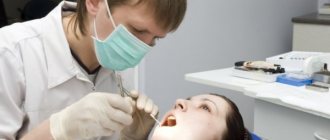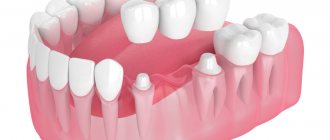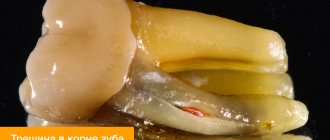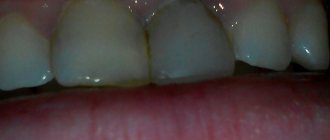From this article you will learn:
- Causes
- Factors of destruction of a molar, incisor or canine
- When a visit to the dentist should be urgent
- Is it possible to get rid of the smell from under the crown on your own?
- How to treat unpleasant odor from under a crown
- Characteristic signs of pathology
A putrid odor coming from under a denture or implant – halitosis – is a clear sign of inflammation in the oral cavity. The reasons for it are different. This could be a medical error, a violation of hygiene, or a symptom of a purulent process in the jaw and gums. If you notice an unpleasant odor coming from under the crown, you should contact your dentist.
Causes
The main reason for the unpleasant odor from under the crown is the proliferation of bacterial flora and rotting food. But this is already a consequence. Possible culprits of halitosis:
- The dentist who installed the dental structure - an unpleasant odor appears a few days after the procedure.
- The patient is a neglect of the rules of hygiene, the presence of bad habits. The smell appears several months and even years after the installation of the prosthesis.
- Common reasons that do not depend on either the patient or the doctor are the life of the tooth under the crown has come to an end, an allergy to prosthetic materials, diseases that are accompanied by severe immunosuppression, and a decrease in bone density.
And most importantly! Regardless of the cause, if you experience bad breath, consult your doctor. Bacterial processes in the oral cavity can cause tooth loss and contribute to the development of abscess and phlegmon of the jaw.
Preventive crown care
The prosthesis installed in the mouth is influenced by food chemicals, saliva, and microbes. Without systematic proper care of crowns, they become covered with plaque, lose their original color, and become a breeding ground for infection.
Prevention of the development of infection in the oral cavity, especially under fixed dentures, involves strict adherence to the following hygiene rules:
- Teeth should be brushed at least 2 times a day: morning and evening, and if possible, more often. Brushing technique: movements of the toothbrush are performed from the gum to the top of the tooth at an angle of 45°. The procedure time is at least 3 minutes.
- Rinse your mouth with clean water after every meal.
- For better cleaning of teeth and dentures, it is recommended to actively use additional devices: interproximal and tuft brushes, dental floss.
- Use irrigators. To rinse the oral cavity, various agents with an antibacterial effect are used that destroy pathogenic microorganisms.
A well-installed prosthesis with good care will reliably and for a long time protect the tooth from external factors. But if a tooth infection does occur and decay begins, without proper treatment the pathological process will only progress, which will lead to serious complications. To eliminate the consequences, long-term treatment with significant financial costs will be required.
Factors of destruction of a molar, incisor or canine
Installing a crown does not provide a 100% guarantee of the safety of a molar, canine or incisor.
Photo 1. Names of teeth
Under the influence of unfavorable factors, they begin to collapse even under a prosthesis. Possible reasons:
- Thermal – temperature changes adversely affect not only the enamel, but also the material of the prosthesis.
- Mechanical - the formation of cracks when chewing solid food.
- Chemical - crowns are made of inert material, but with prolonged exposure to aggressive substances they begin to deteriorate.
- Poor hygiene.
- The general condition - lack of nutrients, calcium, fluoride - leads to the fact that the tooth begins to decay under the crown.
- Infection - the causes are either poor quality work of the dentist, or a severe form of any bacterial, viral or fungal disease.
What does a dentist do?
First of all, he will check whether the prosthesis fits tightly. Then make sure that no caries or periodontal pocket has formed at the edge of the crown. An X-ray examination will be required. The image will show whether caries remains on the surface or has penetrated deep into the tissue, causing inflammatory processes.
In most cases, the crown will have to be removed. If the problem is caused by poor fixation, or the crown has already fallen out on its own, then it can be used again, but most often the prosthetics will have to be done again.
At the initial stage, caries is removed, the cavity is filled with filling material and prosthetics are performed.
In case of significant damage, but the root is intact, prosthetics on a pin is used. A fiberglass pin is inserted into the root. It provides stability to the tooth and prevents thin walls from collapsing. Then the crown is put on.
With significant ( more than 60%
) destruction, use a tab under the stump. This is a microprosthesis that consists of a root part and a crown part. The first is inserted into the root, and the second serves as the base on which the prosthesis is placed.
If pus is released from the gum pockets, the dentist performs an operation - curettage. It cleans the surface of plaque and stone and disinfects them. Additional treatment may be needed to prevent teeth from becoming loose and falling out.
Possible reasons
All possible causes can be divided into 3 groups - the fault of the doctor, the patient and pathological processes independent of them. The latter are extremely rare, and halitosis is not a typical symptom.
Table. Possible causes of bad breath.
| Due to the dentist's fault | Due to the patient's fault |
|
|
Tooth decay is caused by calcium deficiency and bone disease. But these pathologies have characteristic symptoms. The destruction of teeth indicates an advanced form of the disease.
Rules for caring for fixed dentures
High-quality care of crowns in compliance with all hygienic rules can significantly extend the service life of the product.
Since a regular toothbrush is not able to fully clean all hard-to-reach places, additional care products are used to better treat teeth and dentures.
Dental floss (floss). This is a special thread made of nylon, silk, acetate fibers with a flat or round cross-section, designed to clean interdental spaces. To enhance the effect, they are often impregnated with antiseptics.
Floss - disposable toothpicks with a thread on a frame are used for the same purposes as floss.
Bundle brush . The interdental spaces are cleaned using a brush-brush with many long bristles. Dentists recommend alternating cleaning the spaces between teeth with brushes and dental floss, since some of them (floss) are better suited for narrow gaps, and a tuft brush does an excellent job of cleaning wide gaps.
An interproximal brush with a brush is designed to treat hard-to-reach areas between the crown and adjacent teeth.
An irrigator is a device for cleaning the oral cavity using a water jet supplied under pressure. A pulsating stream of water penetrates into the most inaccessible places, cleanses the surface of teeth and artificial dentures from plaque and food debris in the gum pockets and interdental spaces.
Dentists do not recommend using wooden toothpicks at all. Wood particles get stuck between the teeth, begin to rot and cause inflammation. In addition, toothpicks can easily injure your gums without even noticing it.
When a visit to the dentist should be urgent
The appearance of an unpleasant odor from under dental structures is accompanied by additional symptoms. There is no need to delay your visit to the doctor.
Reasons to urgently consult a doctor:
- Mobility, complete or partial destruction of the crown.
- Pain – sharp, dull, aching, shooting, when biting, when brushing teeth, when exposed to thermal irritants.
- Change in gum color - hyperemia, cyanosis, swelling.
- Suppuration from under the crown, gums, formation of fistula tracts.
- Recurrent episodes of sinusitis.
- Numbness of the tongue, strange taste in the mouth.
- General weakness, fever, enlarged lymph nodes.
- Formation of a galvanic couple due to different prosthetic materials. Accompanied by a metallic taste in the mouth and electrical impulses.
But even if nothing besides amber bothers you, then consult a dentist. A bad odor indicates the proliferation of bacterial flora. And the appearance of pain or pus is a matter of time.
What if there is no smell in the mouth after dentures, but there is a strange taste?
If after installing a crown there is no odor in your mouth, but you constantly feel an incomprehensible and irritating taste, you also need to consult a dentist. This phenomenon may indicate both improper fixation of the crown on the tooth, as a result of which the cementing composition is washed away by saliva and causes an unpleasant taste, as well as possible incompatibility of the materials used in the manufacture of the prosthesis.
Another possible cause of a strange taste in the mouth is an allergic reaction.
Here we can only advise one thing - do not try to diagnose yourself, do not follow dubious advice from the Internet, but turn to specialists. Self-medication can lead to negative consequences for your health, the elimination of which requires significant time and large financial expenses. It is better to immediately consult a doctor and get qualified medical care!
And finally: most often complications after the installation of crowns are observed in the case of poor-quality prosthetics. Therefore, do not chase low prices for crowns and their installation - choose a clinic based on the criteria of equipment, staff competence, and the doctor’s ability to work with modern materials and technologies.
Still have questions about the topic of the article? Write to us via chat or dial the contact phone number of our clinic “VENSTOM”!
Is there any way I can get rid of the smell from under the crown on my own?
You can get rid of the putrid smell yourself only by improving the quality of hygiene. This includes high-quality brushing of teeth, the use of floss and rinses.
And most importantly! Independence is good only if the smell has appeared recently and the patient has neglected hygiene rules for a week or two.
In case of tooth decay under the crown, gumboil development, or periostitis, home methods are ineffective.
Photos 2 and 3. Development of flux and periostitis
They can mask the aroma and inhibit the inflammatory process. But it is impossible to suppress the bacterial flora and restore the prosthesis at home.
Factor No. 5: internal diseases of the body
Sometimes patients feel that their breath stinks because of the crowns. However, in fact, the source of the problem may be related to malfunctions in the internal organs. In this case, the breath really smells, but quite often the culprit is diseases of the gastrointestinal tract and metabolic disorders, diabetes mellitus. Internal diseases of the body are often accompanied by an unpleasant taste of metal or iodine.
How to proceed in this case? We would recommend first visiting a dentist, performing professional oral hygiene and eliminating existing problems. And if an unpleasant symptom continues to bother you, then it makes sense to go to a therapist who will issue a referral for an ultrasound and other types of comprehensive examination of the body.
How to treat unpleasant odor from under a crown
At the initial stage of treatment, the doctor must identify the reasons for the appearance of a bad odor from under the dental structure. Diagnostics includes:
- Examination of the oral cavity.
- X-ray of the tooth, according to indications - maxillary sinuses, orthopantomogram.
- Development of a patient management plan.
Based on the examination results, the doctor will suggest therapeutic or surgical treatment. You may need to consult a periodontist or otolaryngologist.
What the dentist can offer:
- Treatment of caries, sanitation of dental canals with their subsequent filling.
- In case of inflammation of the gums, the doctor will evaluate the quality of the installation of the prosthesis and the depth of the periodontal pockets. Their cleaning, rinsing with antibacterial solutions, and applications with medications are indicated. In severe cases, the doctor will prescribe antibiotic injections. After stopping the inflammatory process, physiotherapy is indicated for the mineralization of bone tissue.
- Installation of a new prosthesis - if the old crown cannot be restored, was installed with errors, or the patient has developed an allergy to the materials from which it is made.
- If tooth root cysts are identified, then their removal is indicated. Access is through an incision in the gum. The tooth can be saved.
- If perforation of the maxillary sinus is detected, the implant is removed. The sinuses are sanitized by an otolaryngologist. After stopping the inflammatory process, the bone tissue is restored, the bottom of the maxillary sinus is raised and a new implant is installed.
And most importantly! If a medical error has been made, self-respecting clinics provide treatment under a guarantee. Implantation, installation of crowns, dental structures are expensive services. And if the clinic does not provide a guarantee for its work, then you need to change the medical institution.
Additionally, conservative therapy is indicated - rinsing with decoctions of medicinal herbs, antibacterial drugs, training in the rules of oral care.
How to solve a problem
If the patient doubts whether the carious process under the crown can lead to the complete loss of a molar, dentists answer unequivocally that yes. Therefore, you should not delay the treatment process. After all, the destruction of dental tissue is irreversible, especially when it is constantly aggravated by rotting food and the accumulation of bacterial plaque under the structure. In addition, rotting can lead to inflammation of healthy tissues surrounding the affected root.
To fix the problem, the dentist will remove the denture, examine and clean the surface of the tooth, trying to save it. However, if the patient does not apply in a timely manner, sometimes the molar cannot be saved, the doctor has to remove it and install an artificial implant. Therefore, when the mouth begins to smell unpleasant, some time after prosthetics, we are talking not only about getting rid of this symptom, but also about saving the molar tissue from complete destruction.
You don’t have to prepare decoctions yourself, but buy a ready-made herbal mixture
If you can’t see a doctor right now, you can rinse with a decoction of chamomile, oak bark or calendula to temporarily get rid of putrid breath. This measure will not stop the process of tooth decay, but will help flush out food debris from under the crown and slightly reduce the level of inflammation.
Complete relief from the problem can only be achieved by treating and cleaning the surface of the tooth; therapy in this case depends on the root cause of the phenomenon:
- A denture that is not the right size or has become loose as a result of poor installation results in food debris getting into the gaps. To eliminate this problem, the doctor will remove the structure, clean the surface of the molar and install a new denture made to the exact size of the tooth. Only a tightly fitting crown will help seal the molar and maintain its health.
- Weak fixation of the crown can lead to its loss, then the unprotected tooth will collapse much faster due to the preliminary grinding of the enamel layer. To prevent root rot, you need to see a dentist as early as possible and not skimp on the clinic. The material must be of high quality, strong and durable.
- A weakly fixed pin or poor-quality cementation of the inlay (when the doctor saves time and carries out it in 20–30 minutes, and not every other day, as expected) are dental errors that must be corrected at the clinic’s expense. If the integrity of the tooth is compromised for one of these reasons, the doctor must replace the crown and carry out treatment to correct the poor performance.
An incorrectly selected crown can injure the soft tissue of the gums, causing inflammation and pain. In such a situation, when the prosthesis does not fit in size, the dentist replaces the product with another or trims the soft tissue.
Hygiene procedures
What to do after the problem has been eliminated, in order to avoid re-rotting of the molar under the crown and the development of inflammatory processes in the oral cavity? If the patient has bridges or metal structures installed, he must observe mandatory hygiene rules and use auxiliary devices for dental care:
- an interproximal brush is a brush with which the patient will be able to reach even hard-to-reach areas and clean them; no toothpaste is applied to it;
- beam brush - it was created specifically for the care of braces, bridges, dentures and implants;
- Dental floss – allows you to clean the interdental space as much as possible if this cannot be done with brushes and brushes (it is not recommended to use floss if you have inflammatory gum diseases);
- floss is an analogue of dental floss, equipped with a fixation system, it makes the process of oral hygiene simpler and more convenient;
- An irrigator is a device with which any patient can keep their teeth perfectly clean; its action is based on the release of air bubbles.
Oral care products
In addition to devices, if there are crowns and bridges in the oral cavity, after eating it is necessary to use rinses (you can buy them at the pharmacy, or prepare a decoction of medicinal anti-inflammatory herbs - sage, chamomile, string, oak bark, mint).
There are situations when a patient goes to the dentist with a complaint that the crown creates an unpleasant taste in the mouth, but there is no smell of rot. The reason may be poor cleaning of the cement from the base, as a result of which the pieces dissolve in saliva and leave an unusual taste. This phenomenon can also occur due to incompatibility of the materials from which fillings and dentures are made - the problem is solved by replacing the composition with the same one.
In some cases, there is an allergic reaction to the selected materials or the metal from which the crown is made; for such patients, the use of ceramic products is recommended. Whatever the reason for the unpleasant taste and odor from the mouth after dentures, only a doctor can eliminate the complications, so you should not self-medicate and waste time in order to avoid dangerous consequences.
Characteristic signs of pathology
There are many causes of bad breath. All of them are accompanied by similar manifestations. And an unpleasant odor from under the crown is not a characteristic symptom. This is a sign of an already running chronic infectious process.
Additional symptoms may develop both before and after the appearance of an unpleasant odor. Frequent unpleasant signs of inflammation:
- pain syndrome;
- suppuration;
- food getting stuck;
- gum hyperemia;
- swelling of the face;
- unpleasant taste.
As a rule, before pain appears, many people try to treat themselves. But then they go to the doctor. The later you go to the dentist, the higher the risk of complications and tooth loss.
Factor No. 3: poor quality treatment and prosthetics
An insufficiently experienced dentist could make a number of mistakes at one of the stages of preliminary treatment or preparation for prosthetics. For example, he incorrectly diagnosed or did not complete the treatment of the tooth, did not completely remove the pulp and necrotic tissue, did not carry out antiseptic treatment of the carious cavity, and did not seal it tightly with filling material. In all of the above cases, an unpleasant odor will sooner or later appear under the crown, because... Bacteria will multiply inside and an inflammatory process will occur.
Errors could be made not only by the dentist who treated the tooth and prepared it for prosthetics, but also by the technician or orthopedist who created and installed the structure. For example, the technician may have created it without taking into account the individual characteristics of your bite. Then, after installation, the crown will begin to injure the mucous membrane and surrounding soft tissues, which will be accompanied by painful sensations and, again, can lead to the development of inflammation.
The problem may be caused by errors during the production of the prosthesis.
Often mistakes are made by non-professional orthopedists who, at the time of installation of the structure and its fixation with permanent cement, did not ensure a tight fit to the gum. Then there remains a gap where, after each snack, food gets under the crown. And then you already know everything - the food rots and becomes a source of nutrition for pathogenic microorganisms.
Signs of tooth decay under the crown
Tooth decay under the crown is a dangerous situation for the body. The process is accompanied by the proliferation of pathogenic flora. With the blood flow it enters all organs and systems.
Symptoms of tooth decay under a denture:
- halitosis – the appearance of an unpleasant odor;
- mobility of the dental structure;
- darkening of a molar, incisor or canine;
- taste of pus in the mouth;
- receding gums, exposing the neck of the tooth;
- tissue hyperemia, bleeding from the gums;
- pain when biting, temperature change.
Do not delay in seeing a doctor. The sooner you start treatment, the greater the chances of saving the tooth under the crown and preventing the development of complications. Price list with orthopedic services – follow the link.
Complications from rotten teeth
You should not self-medicate and put off visiting the dentist if your crown stinks. Untreated caries can cause complications that lead to tooth loss and can provoke common somatic diseases.
- Periodontitis
Periodontium is connective tissue, part of the complex mechanism that holds the tooth in the jaw. If microbes penetrate it, the tooth root becomes inflamed and periodontitis begins. It develops gradually and symptoms become noticeable when the disease has already become protracted. With advanced periodontitis, the roots become exposed and the gums begin to bleed. Cysts with purulent contents may form on the root. Treatment of periodontitis is complex and includes surgical methods: removal of the root apex, one root in multi-rooted teeth, tooth separation or root amputation.
- Pulpitis
When preparing for prosthetics, the pulp is not always removed. If it is not removed, it can become inflamed and cause a lot of trouble. Pulpitis, inflammation of the pulp, is accompanied by severe pain. Surgical treatment - depulpation, and then re-prosthetics.
- Cysts, abscesses
Any purulent formation can cause serious complications, because the infection spreads throughout the body through the bloodstream. If abscesses or cysts are not removed promptly, they can cause serious illnesses such as osteomyelitis.
Comments
I have a crown on an implant, and recently I began to notice that there seemed to be a bad smell coming from under it. What could this mean?
Veniamin (10/25/2019 at 11:27 pm) Reply to comment
- Dear Benjamin! You need to pay attention to the accompanying symptoms: pain, swelling and inflammation of the mucous membrane around the implant, its mobility, the formation of spaces between it and the gum. Bad odor combined with one or more of these signs may indicate the development of mucositis or peri-implantitis. Therefore, it is better not to hesitate, but to see the doctor who installed the implant. If you delay, the matter may end in rejection of the implant.
Editorial staff of the portal UltraSmile.ru (10/30/2019 at 09:17) Reply to comment
I don’t actually have a crown, but a whole bridge for three teeth. And there was also a stench coming from under the prosthesis, a feeling that it was coming from under the middle crown... What could this be and what should I do??!!
Lilya (11/11/2019 at 01:19 pm) Reply to comment
- Dear Lilya! The situation for owners of bridges is quite common. Especially if you have been operating the bridge for several years. The fact is that when installing a bridge, the central crown fits tightly to the mucous membrane, but gradually it begins to move away from it - a gap is formed. This occurs due to a decrease in the volume of bone tissue. Naturally, pieces of food that rot begin to fall into this gap. It is simply impossible to clean them out with a regular brush. We hope you use an irrigator for these purposes? If not, we recommend purchasing it. If yes, and the smell persists, then hurry to see a doctor - perhaps rotting food and the proliferation of bacteria have caused an inflammatory process in this area.
Editorial staff of the portal UltraSmile.ru (10/16/2019 at 09:02) Reply to comment
Write your comment Cancel reply
Poor hygiene as a cause of odor
If a person’s breath has acquired a specific “putrid” hue, it is necessary to examine the crown. Poor cleaning and violation of the rules for caring for artificial teeth often leads to complications in the form of a “stale” smell. Dentists warn that they need to be given the same attention as a healthy jaw:
- use only special toothpastes or gels that will not scratch ceramics or zirconium;
- carefully use electric brushes that injure the mucous membranes;
- Massage the gums daily with your finger to speed up the flow of nutrients to the periodontium;
- purchase miniature dental brushes that perfectly clean stubborn plaque.
The patient should remember to see the dentist every 6-8 months. The doctor performs professional cleaning, removes darkening and plaque with ultrasound. He checks the tightness and adjusts the position of the prosthesis. This not only extends the life of the crowns, but also gets rid of pathogenic plaque.
Principle of installation of the prosthesis
In recent years, dental orthopedics has been actively introducing new materials.
Fragile plastic has been replaced by aesthetic porcelain and ultra-durable zirconium. But the general installation technology remains the same. The basis for prosthetics is always a dilapidated tooth that cannot be restored with a filling. After careful grinding, a pre-made overlay is put on it. If several teeth have been lost, the dentist suggests installing a special prosthesis consisting of several crowns. It is also fixed on the remaining “stumps” or secured with the smallest locks. They are pressed as tightly as possible to the gum, protecting it from the ingress of food debris. But even the highest quality construction has a limited service life and requires periodic examination by a dentist.










